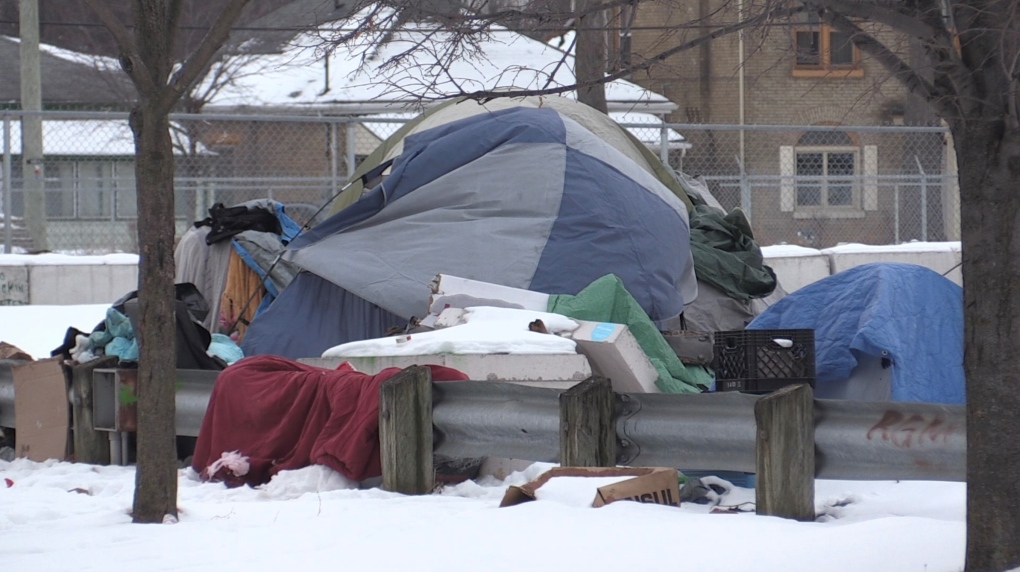'Precedent setting case': Southwestern Ontario judge rules homeless encampment can stay in park
It could be a watershed moment for homeless policies in Ontario.
A judge denied a Region of Waterloo court bid for an injunction to have homeless encampments removed from land at Victoria Street North and Weber Street West in Kitchener, Ont.
Justice Michael Valente stated the reason for his decision is because “the municipality does not have adequate accessible shelter spaces for its homeless population of 1,100 individuals.”
“This is a really precedent setting case,” said Abe Oudshoorn, a housing advocate in London, Ont. “I was actually quite surprised to see this ruling. The idea of folks living in encampments and how they're treated and managed has been something that's been tried [in] other cases, and those cases have not gone forward.”
Oudshoorn said there are a lot similarities between the case and what is happening in London, Ont. right now.
“That similarity is essentially that we have more folks in need than we have capacity to support them,” said Oudshoorn, who had been following this case closely.
He added, “If there is no safe or good place for people to go, then essentially the courts are saying that we can't move them along.”
For those living rough, a tent is sometimes the only option.
“People have to live somewhere,” Colin, a homeless man told CTV News London. “With the price of housing and everything, there is a lot of barriers in place to get out of homelessness. Hopefully this decision gets things moving faster, and I think this is a huge victory for [the] homeless.”
 Homeless encampment in London, Ont., on Feb. 1, 2022. (Daryl Newcombe/CTV London)
Homeless encampment in London, Ont., on Feb. 1, 2022. (Daryl Newcombe/CTV London)
London Mayor Josh Morgan said he’ll immediately talk with his staff and legal team about this case.
“Like any new ruling, we'd obviously look into it and see how it might apply or not to the City of London,” explained Morgan.
Through the election, and the State of the City address earlier this month, Morgan has campaigned on prioritizing marginalized Londoners.
“The main reason that encampments have been broken up in the city [London] is for safety purposes,” said Morgan.
“Mainly for those who are involved in the encampment, and that is done in conjunction with outreach workers and those who know best. That's the new system that we've designed,” he explained. “Ultimately, we're focusing on moving beyond all of this, which is why the work that's being done by the Health and Homelessness Summit, and the work that's ahead is so important to the city.”
Oudshoorn said London has recently been using a support first approach, and that wasn’t the case in Waterloo. London has been handling the homeless encampments on a case-by-case basis.
“We did see that there was risk around [floods], and some folks were caught up in that and had to get out quickly,” said Oudshoorn.
He added, “Of course we want to make sure that people are in a safe location. Wherever people happen to be, the city needs to come to them with an offer of support, and a better place for them to go. And we need to make sure we have capacity to do that.”
Morgan said they'll continue to work to provide safe housing for everyone.
“We want everybody to have a home and that's the system transformation that we're working on,” said Morgan.
The goal is to move beyond temporary measures like encampments and shelters — however, that doesn’t solve the immediate problem.
“The challenge is right now we've got more folks who are out [than] we have places for them to be,” said Oudshoorn.
CTVNews.ca Top Stories

MPP Sarah Jama asked to leave Ontario legislature for wearing keffiyeh
MPP Sarah Jama was asked to leave the Legislative Assembly of Ontario by House Speaker Ted Arnott on Thursday for wearing a keffiyeh, a garment which has been banned at Queen’s Park.
Mountain guide dies after falling into a crevasse in Banff National Park
A man who fell into a crevasse while leading a backcountry ski group deep in the Canadian Rockies has died.
2 teens charged in Halifax homicide: police
Two teenagers have been charged with second-degree murder in connection to an alleged homicide near the Halifax Shopping Centre earlier this week.
'Deep ignorance': Calls for Manitoba trustee to resign sparked after comments about Indigenous people and reconciliation
A rural Manitoba school trustee is facing calls to resign over comments he made about Indigenous people and residential schools earlier this week.
12-year-old hippo in Japan raised as a male discovered to be a female
When Gen-chan arrived at a zoo in Japan in 2017, no one questioned whether the then-five-year-old hippopotamus was a boy. Seven years later, zoo staff made a surprising discovery: Gen-chan, now 12, was female.
Here's why Harvey Weinstein's New York rape conviction was tossed and what happens next
Here's what you need to know about why movie mogul Harvey Weinstein's rape conviction was thrown out and what happens next.
Legendary hockey broadcaster Bob Cole dies at 90: CBC
Bob Cole, a welcome voice for Canadian hockey fans for a half-century, has died at the age of 90. Cole died Wednesday night in St. John's, N.L., surrounded by his family, his daughter, Megan Cole, told the CBC.
Humanist group threatening to sue Vancouver over council prayers
The B.C. Humanist Association has threatened legal action against the City of Vancouver for allowing prayers at council, following a similar warning issued earlier this month to a smaller community on Vancouver Island.
LHSC performs a Canadian first in robot-assisted direct lateral spine surgery
Spine surgery may never be the same for people with chronic back pain and other physical ailments.
































